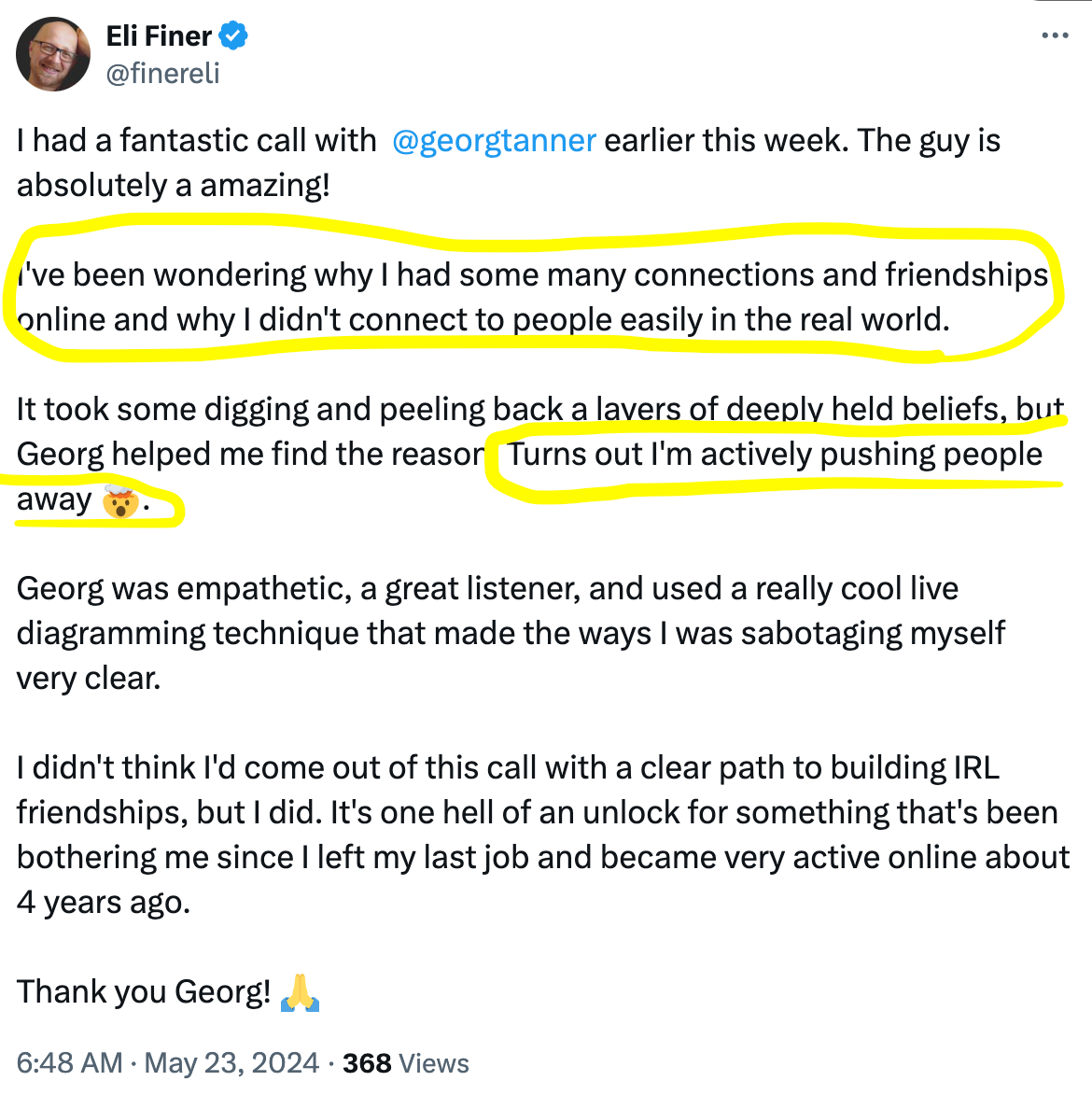How You Rob Yourself From Deep Connection
Self-Protection Blocks Connection And Authentic Relationships
With how many people in your life are you truly yourself, and at ease?
I flew to Australia a couple of months ago to attend a retreat with 20 participants. For the first few days, I felt different, like I did not belong… I was impressed how others could “be themselves” from the get-go, while I felt disconnected. I was social and openly participated in all exercises, but somehow, I held myself back.
And suddenly, on day three, it hit me: I was the one blocking the deep connection, by not showing my full self! 🤯
And I’m not the only one - I heard it many times since, for example from Eli. That’s what triggered me to elaborate in the article.
We Block Connection To Protect Us From Hurt
Most of us go through life wearing a mask. Sometimes that’s conscious - imagine you are in the middle of a big argument with your partner when you remember you have to dial in for an important meeting. You take a few breaths, connect to the call and put up your poker face.
That’s ok, because there is not always space for our personal topics and full range of emotions.
The much more impactful self-sabotage usually happens subconsciously. It’s driven by our inner voices (or parts, if you resonate with IFS) that try to make sense of what’s going on and act in ways that minimise our pain and suffering.
They protect us from things like:
Being made fun of or laughed at
Getting disappointed
Feeling small, unworthy and not good enough
And it works, to a degree. That’s why we keep doing it.
What the Voices Are Telling Us
We all have our own unique specific voices depending on what we have experienced throughout our life. But if you struggle to deeply connect with others, your voices will likely be an expert in split-second judgements and interpretations to convince you the other person is different from you, better than you, not good enough for you, etc.
And then we put on a mask to not get hurt. Let’s take a few examples:
Your wife comes home and says, “Oh, I’m tired.”
Your friend cancels your coffee appointment without explanation.
Your team member snaps at you when you ask a question.
Here’s how your inner voice could interpret that:
Example 1: “Damn, why is she always tired when she’s with me?”
Outcome: You withdraw, feeling “boring,” leading to more disconnection.
Example 2: “Oh, she probably doesn’t want to hang out with me anymore.”
Outcome: You avoid rescheduling, protecting yourself from rejection.
Example 3: “Did I do something wrong? Did she not like my suggestion?”
Outcome: You lose confidence and hold back in future meetings.
All these outcomes decrease connection.
Most Of Your Split-Second Interpretations Are Wrong
The key is to start developing awareness of your interpretations, and questioning them. And a good way to start doing this is to compare the objective situation with your subjective interpretation.
Objective Situation: What you would see/hear if you recorded a video of what happened.
Your Interpretation: How you explain what is on the video.
There are always alternative interpretations—that’s where the gold lies. Let’s revisit the three examples:
Example 1: She may really be tired after a long day with lots of unexpected issues.
Outcome: You offer her empathy and maybe even a massage, increasing connection.
Example 2: Your friend may have her period and feel sick from stomach cramps.
Outcome: You check in with her, offer support, and reschedule, deepening the bond.
Example 3: Your team member may have had a stressful morning getting the kids ready for school.
Outcome: You check in on them and don’t take it personally, maintaining your confidence and contribution.
All of the above outcomes would increase connection.
Cultivating Awareness is Like Learning A New Language
It takes time to make our subconscious voices conscious and even more to create a gap between trigger an reaction. But once you started the journey, you can’t stop.
And once you don’t automatically listen to the stories your mind tells you, you will bring more of your real self into the relationship - that’s when the magic happens.
Here’s a simple exercise you can do as a next step:
Think back to the last time you were triggered, and write down the objective situation that happened.
Then, write down your subjective interpretation and judgements.
Brainstorm 5 alternative, yet plausible explanations
Enjoy.
Key Messages:
Self-protection blocks connection: Wearing masks to avoid hurt prevents deep connections.
Awareness is key: Question your initial interpretations to find the true reasons behind others' actions.
Consider alternative perspectives: Empathy grows by exploring different explanations for someone's behavior.





